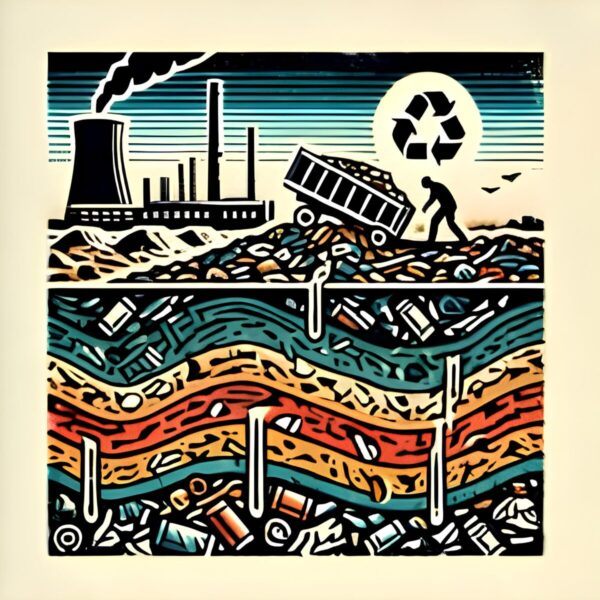Waste management is a major issue for all countries, especially in the Mediterranean region. Justine Viros decrypts waste management in Algeria, specifically in Kabylie, with Melissa Kanane, a doctor in Ecosystem Protection. This week, she provides a more general overview of the different typologies of waste in the Mediterranean, particularly based on sociological criteria.
Melissa Kanane shares with us the results of her work on the waste management scheme in Algeria, the problems and solutions associated with it, and finally, their valorization.
Sequence 2 - Sociology and typologies of waste in the Mediterranean
Waste management in the Mediterranean is a complex issue influenced by sociological, economic, and cultural factors. Within Mediterranean countries, it varies based on the involvement of authorities in their management, the nature of the waste found, education, and the importance given to environmental issues. Waste, depending on how it is studied, is considered as a resource, a hazard, a commodity, an object of management, or an archive. Indeed, they are complex objects that lead us to see the world differently; they provide us with information on environmental policies, urban history, behavioral sciences, social movements, etc. [1]
Waste Variability: Comparison between France and Algeria
The standard of living and consumption habits play a crucial role in the typology of waste produced. In France, urbanization and industrialization have led to an increase in non-organic waste, while in Algeria, organic waste remains dominant due to the prevalence of local markets and traditional food practices. Indeed, waste typologies are linked to dietary habits related to culture and family settings. [2]
In France, recyclable waste such as plastic, glass, and paper represent a significant proportion of the waste produced, reflecting a certain standard of living and widespread access to packaged products. Comparing France to other European countries shows that waste sorting is the least effective there, and when focusing on the South-PACA region located on the shores of the Mediterranean, the waste management situation is even worse. In 2011, the amount of waste produced per capita was 730 kg, compared to an annual average of 592 kg for French households. And the amount being recycled was around 56 kg compared to 77 kg at the national level. [3]
In Algeria, although plastics are also common, organic waste remains predominant and represents 60% of household waste, especially in low-income households. Historically, Algerians managed this waste more locally and organically. Waste management varies significantly across Algeria and the Mediterranean in general. In Kabylie, waste management is more advanced thanks to better community organization and local initiatives. However, in other regions, waste management suffers from funding issues, lack of infrastructure, and low awareness. In Algeria, there is a certain detachment: as long as our house is clean, what happens outside matters little. Losses and wastage of organic waste in the South Mediterranean are sometimes high. Thus, the Food and Agriculture Organization of the United Nations estimates that they amount to 250 kg per capita per year and represent over 60 billion dollars in losses annually, which is $120 per capita, raising questions about the use of natural resources and food security in regions heavily impacted by climate change and where agriculture is highly water-intensive. [4]
Sociological Relationship with Waste
Scientific studies show that the criteria allowing populations to adopt selective sorting behavior include legislation and public policies such as the implementation of infrastructures, taxes, sanctions, communication, etc. But also more individual and intrinsic criteria for populations such as environmental affinities, social influence, and housing (types, proximity, etc.). Similarly, it is shown that increased awareness and knowledge of the impact of waste as well as communication about its management help improve the sorting and consumption habits of populations. Thus, in Kabylie, awareness programs led by local associations and village committees play a crucial role in this awareness. These initiatives include promoting waste sorting at the source, composting organic waste, and reducing the use of plastics. In France, many associations also participate in raising awareness about waste and launch waste collection campaigns such as Clean my Calanques or the association MerTerre.
National and Local Programs: Efficiency and Perception
Factors such as culture, economic development, climate, and energy sources influence the composition of waste; this composition affects the need to collect waste more or less frequently and determines how to dispose of it.
In France, waste management programs are well-established and benefit from significant public support, with strict regulations and developed infrastructure. In Algeria, although national programs exist, their effectiveness is often limited by budget constraints and inadequate infrastructure. There are national programs, such as the National Integrated Waste Management and Valorization Strategy by 2035, but their effectiveness remains limited compared to the amount of waste generated. The malfunctioning of this system, combined with the findings of researchers in this field, highlights the importance of expanding programs for separate waste collection at the source to enable the reduction of household waste sent to landfills, to limit the economic and environmental costs of waste transportation, and to allow for the valorization of sorted materials. [6]
The Mediterranean, a meeting and end point for waste from countries in the basin
The historical perceptions of waste in the Mediterranean show an evolution in the way societies have perceived and managed waste. Traditionally, waste was seen as resources that could be reused or composted. However, with industrialization and modernization, this perception has changed, with waste increasingly being viewed as an environmental and health issue.
During the clean-ups carried out on the beaches of Tizi Ouzou, the waste found was not directly identifiable as coming from other countries, but plastic waste fragments and disperses, storing in the seabed and being ingested by wildlife. The watersheds of the countries bordering the Mediterranean bring their waste flow to the Mediterranean Sea, which facilitates their circulation. The issue of waste is thus a transnational challenge for which regional, national, and international cooperation combined with local initiatives are essential to address this problem effectively.
Waste management in the Mediterranean is influenced by sociological, economic, and cultural factors. The differences between France and Algeria mainly lie in the public policies implemented, consumption patterns (e.g. proportion of organic/non-organic waste), as well as the influence of the standard of living, local and national initiatives, and perceptions of waste, particularly environmental education and awareness.
The environmental, economic, and social dimensions of waste management in the Mediterranean position it as one of the major challenges to address in the coming years. Effective waste management requires a thorough understanding of its impacts and cooperation among stakeholders to develop sustainable solutions tailored to local realities.
Biography

Melissa Kanane: Doctor in ecosystem protection specialized in waste management and part-time lecturer at the University of Tizi-Ouzou in Algeria. Her work is dedicated to the quantification, identification, characterization, and valorization of household and similar waste.

Justine Viros: Scientist specializing in the Mediterranean forest and forest-atmosphere chemical interactions in the context of climate change. She currently holds a Research Engineer position within the Interdisciplinarity Mission of Aix-Marseille University where she is in charge of development missions for the Neede Mediterranean association.
References:
